#congregation Beth Israel
Explore tagged Tumblr posts
Text
A sign reading “We Support Israel” outside a synagogue in Bethesda, Maryland was vandalized with antisemitic graffiti this week, according to the Jewish Federation of Greater Washington.
“The Jewish Federation of Greater Washington is deeply disturbed by the discovery yesterday of antisemitic graffiti on a ‘We Support Israel’ sign outside Congregation Beth El of Montgomery County,” the group said in a statement on Wednesday.
The Jewish Federation noted that the incident came just two days after similar antisemitic graffiti was found near Bethesda Elementary School in Maryland this past weekend. “Israel rapes men, women, and children” was spray-painted on a school sign, and “Free Gaza” was reportedly painted onto a nearby crosswalk and sidewalk.
“We call on our community and allies to continue making it clear that antisemitism and hate speech have no place in Greater Washington,” the Jewish Federation said in its statement. “We are in close contact with local law enforcement, and we appreciate their swift responses to these incidents to ensure our community’s safety.”
The Bethesda area has a large Jewish population — about 45 percent of Maryland’s Jewish community lives in Montgomery County.
The latest incidents of vandalism came amid a troubling wave of antisemitic incidents in Maryland.
Baltimore police announced on Saturday that they arrested a man who is suspected of a hate crime for setting a fire outside the Jewish Museum of Maryland earlier this month. The museum is located between two historic synagogues on Baltimore’s Lloyd Street: the Lloyd Street Synagogue and the B’nai Israel Congregation. The fire on Aug. 4 was set outside the museum but also right next to B’nai Israel, which reportedly shares a security gate with it.
Weeks earlier, Baltimore’s mayor and police chief denounced a slew of antisemitic incidents in which the homes of Jewish families in the Glen section of the city were graffitied with swastikas. As many as 10 homes were targeted in the spree of hate, according to a local NBC affiliate, shocking locals who were dismayed that the incidents occurred in their neighborhood.
Such outrages aren’t new. In December, for example, vandals twice slashed a pro-Israel sign displayed on the lawn of the Baltimore Hebrew Congregation in Pikesville, local media reported. In a later incident in March, a gang of teenagers mugged and assaulted two Jewish men who were walking into their synagogue. The youths reportedly chased one of the men and stole a “large amount of cash” from the other. More recently, an Israeli flag was ripped and stolen from the porch of a doctor’s office earlier this summer.
Across the state of Maryland, which had the seventh most antisemitic incidents in the US in 2023, outrages targeting the Jewish community increased 211 percent compared to the prior year, according to the Anti-Defamation League’s latest data.
#we support israel#bethesda maryland#congregation beth el of montgomery county#congregation beth el#jewish federation of greater washington
13 notes
·
View notes
Text
Lost and found department: synagogues of Manhattan
Illustration by A Journey through NYC religions Ellen Levitt is one of the most interesting detectives in the city. Her job as a writer is finding lost synagogues. The book about her sleuthing in Manhattan, Staten Island and Governeur’s Island is available for purchase. The Last Synagogues of Manhattan is a densely packed treasure trove of architectural observations, naming practices, and…
#Abelardo Berrios#B&039;nai Menasheh#Beit Knesset HaGadol#Beth Ha-Knesset Ha Gadal#Congregation B’nai Israel#Ellen Levitt#Iglesia Pentecostal Camino A Damasco#John Lugo#La Sinagoga#Methodist Episcopal Church of the Savior#Nachlath Svi#Nachlath Zvi B’nai Israel Linoth Hazedek B’nai Menashe#South Harlem Methodist Episcopal Church#The Lost Synagogues of Manhattan
0 notes
Text
Uggghhh, what is UP with Canada?!
In Vancouver, the Schara Tzedeck synagogue's windows were smashed on April 19th.
In Toronto on April 19, five windows at the Kehillat Shaarei Torah synagogue were smashed with a hammer.
In Toronto on April 26, someone set a sign on fire at Beth Tikvah Synagogue....
....And again on April 28.
In Toronto in May, Jewish community members started escorting a kid to school because he was being bullied by peers who told him, "We're going to do to you what Hamas did to Israel," pushed him, kicked him, threw stones at him, and told him, "we need to kill you." This had been going on for six months. (His family had gone to both the school and police repeatedly at this point and it had only escalated; the kids throwing stones at him on the way to school was new.)
In Toronto on May 17th, Kehillat Shaarei Torah's windows were smashed again.
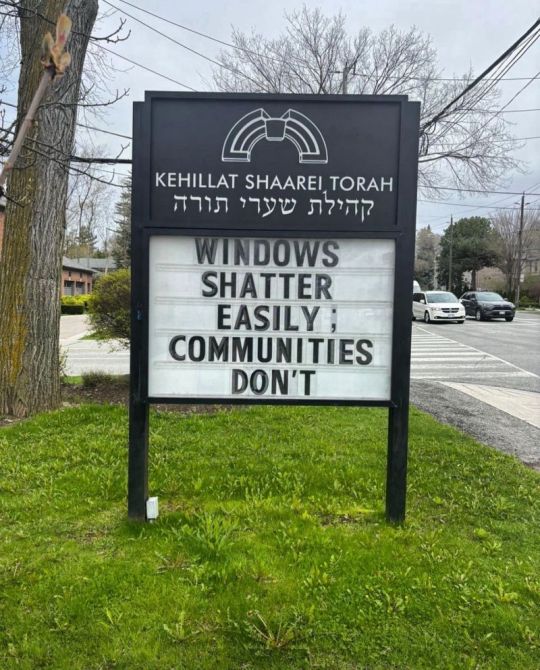
On May 25th before dawn, two people shot at Bais Chaya Muska, a Jewish girls' school in Toronto.
On May 29th, in the middle of the night, someone shot at the Belz Yeshiva Ketana school in Montreal.
In Vancouver on May 30, someone poured fuel on the doors of the Schara Tzedeck synagogue, then firebombed them.
In an article on June 7, Rabbi Lisa Grushcow of Emanu-El-Beth Sholom synagogue in Montreal said people have yelled “Hitler was right!” and “Jew!” at her congregants as they arrive for Shabbat services and that Jewish kids are being bullied in local schools.
On June 1 in Toronto, a man smashed the window of the Anshei Minsk synagogue with a rock.
On June 3 in Kitchener, someone smashed the front door of Beth Jacob synagogue.
On June 19th in Montreal, three small bullet-like holes were somehow made in the windows of Falafel Yoni. (I don't know, all the articles go out of their way to say they don't know WHAT made the holes.) Falafel Yoni is owned by a Jewish man who was born in Israel, and has appeared on boycott lists despite the owner never having said anything political about Israel.
On the same day, down the street from Falafel Yoni, someone smashed the windows of a nearby gym whose co-owner is Jewish and had also been born in Israel.
On June 30 in Toronto, someone threw stones at the Pride of Israel synagogue, then at Kehillat Shaarei Torah, smashing windows (again) in the latter.
On the weekend of July 27th, a father and son in Toronto were arrested for planning a terrorist attack and murder on behalf of ISIL, which is wild.
On July 29th, someone torched a bus belonging to the Bobov Hassidic school in Toronto.
And smashed the windows of a DIFFERENT Jewish school in Toronto, Leo Baeck Jewish Day School, and set it on fire.
On July 31 in Toronto, guess which synagogue had three signs set on fire? That's right: Kehillat Shaarei Torah.
Plus one sign set afire at Toronto's Temple Sinai Congregation the same night, presumably by the same arsonist, who might even have been the stone-hurler of June 30.
There are probably ones I missed. Just putting this list together took like three hours, though. I kept having to go, "Wait, surely that can't be the same synagogue AGAIN" and "they only mention the closest major intersection, which one was this?!" and "that can't be a different one, how many windows did they smash??" and go look for more sources. Plus a couple of articles were giving conflicting dates for one of the incidents.
And nobody ever gives actual dates, they just say shit like, "Blah blah blah was reported Monday...." so I have to look at the article date and then look at a damn calendar.
I went back as far as April because everything I found was referring to earlier incidents. Back to April. February and March were relatively quiet, at least in the news. Although interestingly, February is when the most hate crimes in Toronto had been reported, at least as of ... oh, I see.
As of March.
On the bright side, I did discover that Kehillat Shaarei Torah consistently has great jokes on its sign.
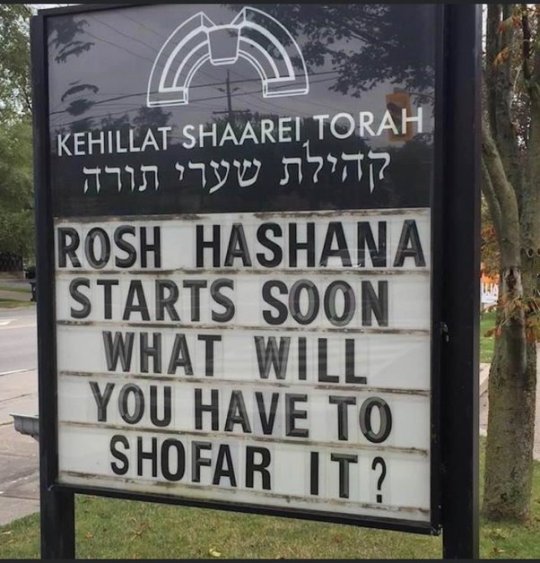
#antisemitism#judenhass is such a good word#jew hatred is what it means#reblog to fight antisemitism#jumblr#jewblr#wall of words#gun violence tw
440 notes
·
View notes
Text
Assailants firebombed a synagogue in a Montreal suburb for the second time in just over a year, the latest in a series of attacks on Canadian Jewish institutions since Hamas’ Oct. 7, 2023, invasion of Israel.
As in the other recent attacks on Canadian Jewish sites, no one was injured in the incident.
Mordecai Zeitz, the emeritus rabbi at Congregation Beth Tikvah, a modern Orthodox synagogue in the suburb of Dollard-des-Ormeaux, said the congregants met for morning prayers on Wednesday morning outside the synagogue.
“We were able to recite the morning prayers in an abbreviated way,” he said.”We did not close even if we had to go outside to avoid the fires on the inside, but we had the fires of Jewish identity and Jewish pride very much front and center, in front of the charred doors of the synagogue,” Zeitz told the Jewish Telegraphic Agency.
Police told the Montreal Gazette there were no injuries and that witnesses reported seeing a suspect at the site prior to the arrival of police. The building suffered minor smoke damage in addition to its front glass shattering.
Assailants tossed a firebomb at the same synagogue in November 2023 just weeks after Hamas’ invasion, which launched Israel’s multi-front war. There have been a number of similar attacks on Canadian Jewish institutions since then, including shots fired at Jewish schools. In August, bomb threats were sent to dozens of Jewish institutions across Canada.
This week’s attack also comes after a violent pro-Palestinian demonstration in Montreal in late November where protesters burned Israeli Prime Minister Benjamin Netanyahu in effigy. And it comes roughly two weeks after an Australian synagogue was firebombed.
Zeitz said the damage was limited to the shattered glass and to the vestibule, and that he expected services to be held inside on Wednesday evening. The synagogue was inviting non-congregants to attend a solidarity Shabbat service on Saturday morning, he said, noting that the day school attached to the building had stayed open and functioning.
“We are never out of business,” he said.
B’nai B’rith Canada called on the authorities to do more to stem the violence.
“This is a terrifying reminder that Montreal is increasingly unsafe for Jewish people,” the synagogue’s cantor, Henry Topas, said in a statement.
“This is the result of the failure of leaders at all levels to hold accountable those responsible for the hate and violence that is infesting Canadian society,” said Topas, who is also B’nai Brith Canada’s regional director for Quebec and Atlantic Canada. “Specifically, Mayor Valerie Plante must act now to stop the exponential rise in hate and antisemitism which she has permitted to get out of control in Montreal.”
Plante and Canadian Prime Minister Justin Trudeau condemned Wednesday’s attack and vowed to track down the perpetrators.
“This vile antisemitic attack against Montreal’s Jewish community is cowardly and criminal,” Trudeau tweeted. “I trust the perpetrators behind this hateful act will be quickly brought to justice.”
Plante wrote on social media that “antisemitic actions are criminal actions,” adding, “It is intolerable that citizens of Montreal should live in insecurity because of their faith.”
75 notes
·
View notes
Text
Far-left, pro-Palestine Councilmember Shahana Hanif is suddenly bending over backwards to show support for the Chosen People — now that she’s in a tight challenge against a Jewish primary opponent.
Until just four months ago, Hanif, 33, who reps the 39th district — which includes parts of Brownstone Brooklyn, including liberal bastion Park Slope, but also heavily Orthodox Jewish Borough Park — has almost never bashed Hamas or spoken up for Israel.
But when the Israeli restaurant Miriam was vandalized last week in Park Slope, the councilwoman fired off a statement to condemn the vandalism
“This hateful act threatens the safety of our community,” she wrote on X.
On the first anniversary of the Oct. 7 massacre, Hanif released a statement of support calling out the terrorist bloodbath — something she rarely does.
Hanif was singing a far different tune before a primary threat emerged in August from Maya Kornberg, a Jewish Democrat who works at NYU’s Brennan Center for Justice.
In April 2023, Hanif was one of just two council members to vote against an ‘End Jew Hatred Day’ resolution — calling it a “far right” idea.
In the days after Hamas’ attack Hanif insisted in a since-deleted post on X “the root cause of this war is the illegal, immoral, and unjust occupation of the Palestinian people,” and that “no peace” should be expected.
At a “Cease Fire Now Rally for Gaza” in Bryant Park where Hanif was arrested, hundreds of protestors shouted the anti-Israel chant, “From the river to the sea, Palestine will be free.”
Another since-deleted X post from Hanif demanded a “ceasefire” just five days after the slaughter in an effort to shut down any military response from Israel.
So far, Hanif, elected in 2022, has raised about $68,000 for the June 24 primary contest, while Kornberg is nipping at her heels with almost $63,000 in the bank, according to campaign finance data.
Rabbi Andy Bachman, a former senior rabbi at Congregation Beth Elohim in Brooklyn, said Hanif called him to offer support in August after a bookstore in her district canceled a talk from him because he was a “Zionist” — but described her recent outreach “too little and too late.”
“My perspective is as a lifelong proud Democrat, any politician who is unwilling to . . . condemn Hamas as a terrorist organization is simply not fit to lead,” he said.
In a statement Team Hanif said she would “always work to keep all New Yorkers safe by addressing the root causes of violence” and insisted that she had “repeatedly and categorically condemned Hamas.”
They refused to send any past example of her doing so.
39 notes
·
View notes
Text

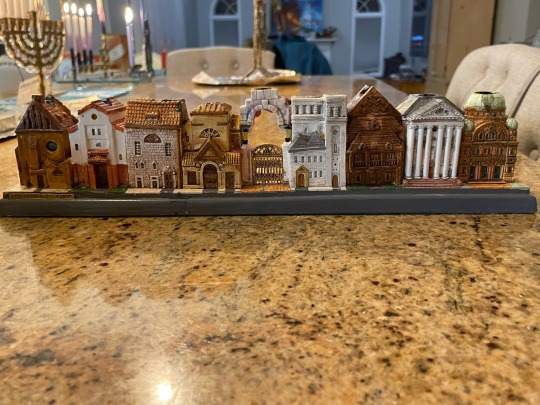
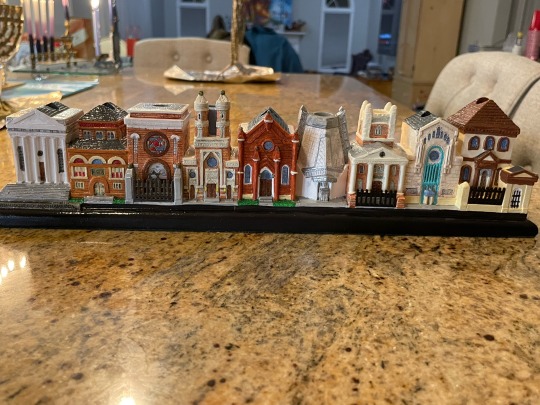
These are the three menorahs that we own that we did not light this year (but we did display them).
The first one is an artsy menorah that I'm pretty sure we got at the same time as our oil one. It is very much not my style and has never been. We've never used it, likely because my mom doesn't want to bother with having to clean out the wax from various places, which I get.
The second one is Synagogues of Europe by artist Maude Weisser. The plaque on it says it was made in 1995, but I'm not sure when/where we bought it. As you can see, it hasn't survived previous lightings very well, which is why we didn't light it or the next one.
The synagogues depicted are (from right to left):
Prague, Czechoslovakia: The Altneuschul or "Old-New Synagogue" (c.1280)
Toledo, Spain: Santa Maria La Blanca Synagogue (c. 1200)
Dubrovnik, Yugoslavia: The Dubrovnik Synagogue was built in the 17th century
Cracow, Poland: The Rema Synagogue (c. 1550)
Vilna, Poland: This gate is located at the entrance to the Shulhof on Jews' Street in the Jewish Quarter of Vila.
Lutsk, Poland: The Lutsh Fortress Synagogue (c. 1626)
Zabludow, Poland: The Zabludow Synagogue (c. 1756)
Budapest, Hungary: The Synagogue in Obuda (1820)
Florence, Italy: Tiempo Israelitico, completed (1882)
The third one is Synagogues of North America, also by artist Maude Weisser. This one has a little plaque that says it was designed in 1997, but we got it two summers ago at the Touro Synagogue (the synagogue on the far right), the first purpose-built synagogue in the United States, in Newport, Rhode Island, where the artist herself was working (!!!).
The synagogues depicted are (from right to left):
Newport, Rhode Island: Touro Synagogue (dedicated 1763)
New York City: Temple Emanu-El (built in 1929)
New York City: B'nai Jeshurun (consecrated in 1827)
Elkins Park, Pennsylvania: Beth Shalom (built in 1959; designed by Frank Lloyd Wright)
San Fransisco, California: Shearith Israel (built in 1854)
Cincinnati, Ohio: Congregation B'nai Jeshurun (built in 1848)
Boston, Massachusetts: The Vilna Shul (built in 1919)
Chicago, Illinois: Kehilat Anshei Ma'Arav (built in 1891)
Charleston, South Carolina: Beth Elohim (built in 1840)
Bonus: a shot of all our menorahs because seven nights’ worth of candles is too pretty not to share:
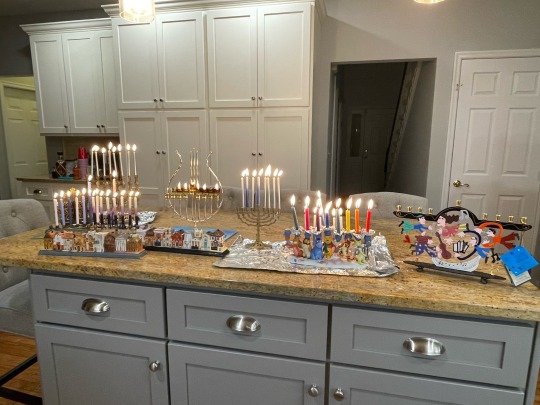
#Hanukkah#Chanukah#hanukkiah#menorah#my hanukkiot#synagogue#synagogues of europe#synagogues of north america#maude weisser#long post#my menorahs#chanukahproject
13 notes
·
View notes
Text
In Canada over the past year, and especially recent months, attacks on Jews and Jewish institutions have reached epidemic levels.
Congregation Beth Tikvah in Montreal was firebombed - twice.
Antisemitic graffiti was found multiple times at Toronto mass transit sites.
More antisemitic graffiti was scrawled in Jewish neighborhoods of Toronto including a synagogue..
Bais Chaya Mushka Elementary School in York was hit by gunfire three separate times.
Someone set fire to the front doors of the Schara Tzedeck Synagogue in Vancouver.
Montreal’s Belz Yeshiva Ketana was shot at.
And these are only a few of the incidents.
But Canada's version of "Jewish Voice for Peace," an anti-Zionist but purportedly Jewish organization called "Independent Jewish Voices," is almost completely silent.
I can find only one mention of one incident - and that didn't condemn it, but warned against anyone jumping to conclusions that the people who smashed windows in a Fredericton synagogue were anti-Israel.

Meanwhile, in that same town, a Jewish Israeli teen was assaulted mercilessly by a Muslim student at her school over "Gaza" - on video, witnessed by several students who didn't lift a finger to help - and it took two weeks for police to make an arrest. Of course, IJV didn't say a word of protest for that or the dozens of other antisemitic incidents that made headlines in Canada over the past year.
IJV claims to be against antisemitism. Its silence proves otherwise. When the attackers have even the slightest chance of being anti-Israel, then they condone those attacks with their silence.
There is nothing Jewish about IJV. They, like similar groups in the US, UK and Australia, just use their supposed Judaism as a means to make hating proud Jews socially acceptable.
If there is still a "pintele yid" inside anyone who considers IJV to be their home, hopefully they will realize they are being used a mere props for an organization that supports antisemites.
9 notes
·
View notes
Text
Published: Dec 23, 2024
Something is rotten in Canada, not just the crumbling coalition government.
Some 400,000 Jews – the fourth-largest Jewish population center in the world after Israel, the US, and France – live in the beautiful, spacious country that takes pride in its heritage of tolerance and pluralism.
Now, this population is under attack. B’nai Brith Canada (BBC) saw a record high of 5,791 antisemitic incidents in 2023, a 109% increase from years prior.
Shimon Koffler Fogel, the outgoing CEO of the Centre for Israel and Jewish Affairs (CIJA), the leading Canadian Jewish community advocacy agency, recently gave testimony before the Canadian Senate’s Standing Committee on Justice and Human Rights.
As Post columnist David Weinberg wrote on Friday, Fogel told the committee that since Hamas’s October 7 massacre and Israel’s retaliation in Gaza, there has been a 93% rise in hate crimes in Toronto, nearly half of them directed at the Jewish community.
In Vancouver, reports of antisemitism increased by 62% in 2023 over 2022, marking a 70% rise after October 7. In Montreal, antisemitic incidents rose by 250%.
As for Toronto, shots have been fired on three different occasions at Bais Chaya, a Jewish girls’ school, with the most recent incident occurring on Friday night.
In Montreal, assailants last week firebombed Congregation Beth Tikvah, a modern Orthodox synagogue in the Montreal suburb of Dollard-des-Ormeaux, for the second time in just over a year.“This is a terrifying reminder that Montreal is increasingly unsafe for Jewish people,” the synagogue’s cantor, Henry Topas, said in a statement.
An accountability failure
“This is the result of the failure of leaders at all levels to hold accountable those responsible for the hate and violence that is infesting Canadian society,” Topas, who is also the BBC’s regional director for Québec and Atlantic Canada, added.
“In a matter of months, Canada has become a country in which masked thugs took over our streets to burn Canadian flags, salute Hitler, celebrate terrorists, and call for violence,” said Richard Marceau, the vice president of external affairs and general counsel at the CIJA.
The efforts to combat the rising tide of antisemitism in Canada weren’t helped at the weekend by the exchange of statements between Diaspora Affairs and Combating Antisemitism Minister Amichai Chikli and Canadian Liberal Party MP Anthony Housefather, Prime Minister Justin Trudeau’s Jewish community adviser.
In a post on X/Twitter, Chikli claimed that Canada was no longer safe for Jews. Responding to Chikli, Housefather said that his comments were “false and exaggerated” and that Canada was one of the best places in the world for Jews to live in despite the rise in antisemitism.
What is the truth?
The truth is probably somewhere in between.
Trudeau said he was “sickened by reports of shots fired at a Jewish elementary school in North York.” He called it “a hateful, antisemitic attack.”
Trudeau issued a similar statement last week after the Montreal attack, but many Jews in Canada say that his government’s desire not to provoke the country’s large Muslim population has muted any concrete response.
Additionally, they say that Canada’s lukewarm support of Israel post-October 7 (Trudeau is one of the few Western leaders who did not pay a solidarity visit to Israel) has emboldened the anti-Jewish sense of empowerment.
On Friday, however, the Canadian government announced that it has created a National Forum on Combating Antisemitism, which will be held in Ottawa in February 2025.
“The Government of Canada recognizes the urgent need for national leadership to ensure Jewish Canadians feel safe in their synagogues, schools, and communities,” a statement read.
Deborah Lyons, Canada’s special envoy on preserving Holocaust remembrance and combating antisemitism, welcomed the forum, saying, “Jews are the number one target of reported hate crimes in Canada despite making up just over 1% of the population. Antisemitism shouldn’t be a partisan issue.”
How Canada responds and deals with the scourge of antisemitism will have far-reaching implications for Jews in the rest of the Diaspora. If Jews aren’t safe in Canada, they won’t be safe anywhere.
Let’s hope that the platitudes of protecting the Jewish community will translate into concrete action that demonstrates there will be zero tolerance for targeting anyone solely because they’re Jewish.
--

#Canada#antisemitism#terrorism supporters#islamic terrorism#islamic violence#islam#religion is a mental illness
3 notes
·
View notes
Text
Dr. Yosef Ben Jochannan Black Jewish Historian Of His People
by Rabbi Sholomo B. Levy
The Israelite community mourns the passing of our beloved elder Dr. Yosef Ben Jochannan (1918-2015). He was born in Ethiopia and raised in the village of Gondar according to the customs of the African Jews in that region who are known as Beta Israel. His father was a member of this community and he was named after his grandfather Jochannan. In fact, his name is Hebrew and means Joseph the son of Jonathan. He received a Bar Mitzvah and during his adolescence moved to the Virgin Islands and Puerto Rico before immigrating to the United States. His magnum opus, We The Black Jews, was the first major historical work written by us, about us, and primarily for us. As such, Dr. Ben, as he was affectionately known, was our scholar and our champion. Long before his reputation commanded attention on the international stage, he was embraced by Chief Rabbi W.A. Matthew, leader of the Commandment Keepers Ethiopian Hebrew Congregation in Harlem. As a Jew of Ethiopian birth, Dr. Ben dedicated the second volume of We The Black Jews to Rabbi Matthew. He was a frequent visitor to many Black synagogues. In 1977, Dr. Ben accepted an honorary faculty position with the Israelite Rabbinical Academy at Beth Shalom Ethiopian Hebrew Congregation in Brooklyn, New York. In that photograph you see him flanked by most of the Black rabbis in New York City including Chief Rabbi Levi Ben Levy and his dear friend from Ethiopia, Rabbi Hailu Paris, who was the leader of Mt. Horeb Congregation in the Bronx. (see photo above) Dr. Ben maintain a close relationship with the Black Jewish community throughout his life.
Dr. Ben’s work expanded to explore the Egyptian origins of Judaism, Christianity, and Islam. When asked about this shift in academic focus, Dr. Ben explained that he was attempting to put our identity as Black Jews into its proper historical context as a people and religion that literally came out of Africa. He demonstrated that the Torah and archaeological evidence both supported the claim that All the Hebrews who settled the biblical land of Israel—including Moses, Aaron, Miriam, and Joshua—were born in African and raised in Egypt. Zipporah, the wife of Moses, was born in Ethiopia, like Dr. Ben. As Black Jews we have always been comfortable with acknowledging our ancient and modern connections with Africa. The greatest criticism and opposition that Dr. Ben faced came from those who attempted to deny this connection and to remake Judaism into a White European creation. It is important to remember—as Dr Ben so frequently emphasized—“Judaism is not a race.” He expressed a pride in the fact that the first Jews would be considered Black if they lived in our radicalized world. Dr. Ben never asserted that all Jews are Black—in fact on many occasions and in much of his writings he refers to Jewish communities all over the world.
In latter years, Dr. Ben startled many of his supporters when he began to distinguish his ancestry as a Jew with his skepticism about the existence of God. At one point, he reached the conclusion in his own mind that “God is not a reality.” We do not know whether this view grew out of the frustration of fighting religious battles for so many decades or from an academic position that demands logic according to human understanding and does not allow for faith, mystery, or the divine. What we do know is that through all of his transitions he remained a man with a keen intellect and a loving heart.
As millions of Jews around the world prepare to celebrate the Passover, a commemoration of our Exodus from Egypt, we celebrate the life and work of Dr. Ben who meticulously and courageously made two irrefutable points: Egypt is in Africa and African people are Black. Therefore, we who call our Jews must trace our ancestry back to these Black Africans.
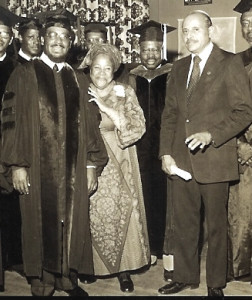
Rabbi Levy, Alma John, Dr. Ben, Percy Sutton Beth Shalom Ethiopian Hebrew Congregation, 1977
9 notes
·
View notes
Text

ブッシュ家と繋がりのある投資会社オースティンがトランプ暗殺未遂事件の1日前にトランプのTruthSocial株を1,200万株空売り 『トランプに何が起こるか知っていたのだろうか?』 オースティンの幹部はパパブッシュ政権で国務長官を務めた、レーガン及び子ブッシュ政権でも様々な役職を務めた 子ブッシュは反トランプ 直接的な関与があるかは不明だが十分にあやしい動き オースティン・プライベート・ウェルスから寄付金を受け取っている団体の一部 ↓ ・ADL(日常生活動作:ユダヤ系) ・ACLU(米自由人権協会) ・Hadassah(ユダヤ人女性組織) ・Shalom Austin(テキサス州にあるユダヤ人の中心地) ・Camp Young Judaea(ユダヤ・イスラエル人のキャンプ) ・Austin Jewish Academy(ユダヤ人学校) ・Congregation Beth Israel(改革派ユダヤ教シナゴーグ) ・Jewish Community Center(ユダヤ教団:日本にも支部有り)
2 notes
·
View notes
Note
hey, do you know of any queer/trans-inclusive temples in southeast portland (or easily accessible by transit from southeast portland)? i understand if you don't want to name any on tumblr for privacy reasons but i'm looking into potentially converting and figured i would reach out and ask. alternatively if you know of good ways to find temples that are specifically queer/trans-inclusive i'm open to doing my own research as well, i'm just not certain where to start. thanks in advance!
This is something anybody could Google so I don't know that I think it's an issue to link you to Shir Tikvah, on NE Sandy. A bunch of bus lines go up Sandy. :) There's also a Reform congregation, Beth Israel, which is in NW but very accessible on transit. There are a few trans folx there, but I think Shir Tikvah might be more what you're looking for.
(Welcome to Portland!)
15 notes
·
View notes
Text
by Peter Reitzes
A member of the Raleigh City Council in North Carolina who has come under fire for regularly attacking Israel and Zionists received a major blow to her re-election bid this week, with the local Democratic Party opting to endorse her opponent as the embattled lawmaker continued to receive backlash from Jewish and progressive leaders.
Following two recent reports by The Algemeiner, Mary Black came under increased scrutiny from the media, community members, and fellow Democrats for spending a disproportionate amount of time lashing out at the Jewish state, despite her job having no apparent responsibilities concerning Middle Eastern affairs.
Amid the uproar, the Wake County Democratic Party — who endorsed Black in 2022 — came under pressure not to endorse Black this year.
On Monday, the Wake County Democratic Party — which includes Raleigh — endorsed Black’s opponent, Mitchell Silver, who is a former New York City Parks Commissioner and Raleigh Chief Planner. Political insiders tell The Algemeiner it is now unlikely Black will be re-elected even as an incumbent in this nonpartisan election.
A local columnist explained, “In a county and city that vote heavily Democratic, the party’s endorsements will guide many voters. That’s especially true this year when a presidential and gubernatorial election will bring a wave of voters to the polls who are unfamiliar with local officials and issues.”
There is widespread agreement that Black won her seat in 2022 in large part based on the endorsement of the party.
Nonetheless, Black dismissed the importance of being passed over by the party.
“I’m actually kinda happy to not be endorsed by the dems this time [sic],” she posted on social media. “That means I can talk shit without fear … I can be a menace now.”
Local Jewish and Democratic leaders told The Algemeiner that they were both “thrilled” and “relieved” that the party did not endorse Black.
“The caucus is thrilled to see that the Wake County Democratic Party shares our belief that Mitchell Silver is the most qualified candidate for District A. Mitchell will continue his long track record of delivering results for Raleigh,” said Conner Taylor, 2nd vice chair of the North Carolina Democratic Party Jewish Caucus.
Rabbi Eric Solomon of Beth Meyer Synagogue, the largest congregation in Raleigh, added that he was “relieved that the Wake County Democratic Party did not endorse Council Member Mary Black, a city councilor who exploited her position of power to incite against her district’s Jewish community.”
#mary black#antisemite#antisemitism#wake county#wake county democratic party#raleigh north carolina#raleigh city council
12 notes
·
View notes
Text
Lost and found department: synagogues of Manhattan
Illustration by A Journey through NYC religions Ellen Levitt is one of the most interesting detectives in the city. Her job as a writer is finding lost synagogues. The book about her sleuthing in Manhattan, Staten Island and Governeur’s Island is available for purchase. The Last Synagogues of Manhattan is a densely packed treasure trove of architectural observations, naming practices, and…
#Abelardo Berrios#B&039;nai Menasheh#Beit Knesset HaGadol#Beth Ha-Knesset Ha Gadal#Congregation B’nai Israel#Ellen Levitt#Iglesia Pentecostal Camino A Damasco#John Lugo#La Sinagoga#Methodist Episcopal Church of the Savior#Nachlath Svi#Nachlath Zvi B’nai Israel Linoth Hazedek B’nai Menashe#South Harlem Methodist Episcopal Church#The Lost Synagogues of Manhattan
0 notes
Text
“It’s weird because I’m not scared,” said Rabbi Eric Woodward of Congregation Beth El-Keser Israel. “At our synagogue, we take safety and security very seriously, and I think this is a really loving community here in New Haven.” "Even with high-level threats about a month ago when extremist groups were calling for a “National Day of Hate,” Woodward said about 250 people showed up at the service that day “to show up and be Jewish and be proud.”
“I think that people are scared of this, but the fear doesn't get them down,” Woodward said. “I think fear leads them to be brave.”
8 notes
·
View notes
Text
(JTA) – At least two more synagogues in the United States evacuated their congregants over the weekend following bomb threats, the latest in a series of such calls that have put dozens of congregations on high alert heading into the High Holidays.
One of the synagogues was threatened during the pre-Rosh Hashanah Selichot services on Saturday night, in a sign that the perpetrators of the wave of attacks are paying careful attention to when synagogues are holding events before calling in their threats.
Since mid-July, at least 49 synagogues in 13 states have received the threatening calls, none of which have been linked to credible bomb threats, according to the Anti-Defamation League. That was up from 26 congregations four weeks ago —and the ADL expects the threats to continue when the High Holidays begin with the start of Rosh Hashanah on Friday evening.
“Every weekend this network of swatters continues to identify targets and are calling in fake bomb threats,” Oren Segal, vice president of the ADL’s Center on Extremism, told the Jewish Telegraphic Agency, using a term referring to pranks that draw out a large number of police officers. “So that number is increasing and will potentially keep increasing.”
Segal said the calls are part of a coordinated campaign orchestrated by antisemitic trolls and focused on synagogues that livestream their services, so the perpetrators can watch reactions to the threats in real time. But he noted that some institutions have been targeted even though they don’t livestream their events, and that the culprits are also developing a growing interest in non-Jewish institutions such as mosques and Black churches.
The synagogues that received bomb threats this weekend were Congregation Beth Am in Los Altos Hills, California, in the Bay Area, and Congregation B’nai Israel in St. Petersburg, Florida. In both cases, the synagogues emptied out as police conducted full safety sweeps of the premises.
The threat on Beth Am, a Reform congregation, was called in during Friday night services, at a time when the synagogue was hosting U.S. Rep. Anna Eshoo and Jeremy Ben-Ami, president of the liberal Israel lobby J Street. Both guests were reported safe by leaders of the Bay Area congregation.
“As a community, we remain resolute and determined in the face of this act of antisemitic harassment,” read a letter Beth Am congregational leaders sent to their community just before midnight on Friday, after the synagogue had been swept and cleared, according to J. The Jewish News of Northern California, which first reported on the incident.
B’nai Israel, a Conservative congregation, received the threat as congregants were exiting the Selichot services on Saturday night. The St. Petersburg police department and B’nai Israel’s rabbi, Philip Weintraub, confirmed details of the synagogue’s evacuation with JTA.
“It was not disruptive to our worship,” Weintraub told JTA, adding that the police “took it very seriously.”
A spokesperson for the St. Petersburg Police Department told JTA that the investigation was still ongoing, but that law enforcement would treat the incident as a false bomb threat, which is punishable with prison time. Florida has grappled with a recent rise in antisemitic activity, and a new state law aims to make it easier to prosecute “ethnic intimidation.” But that measure hasn’t yet succeeded in curbing a statewide epidemic of antisemitic fliers, some of which were dropped outside the West Palm Beach area over Labor Day.
The Santa Clara County sheriff’s office, which oversees law enforcement in Los Altos Hills, did not return JTA requests for comment on its own bomb threat investigation.
In mid-August, two other synagogues in California also evacuated their livestreamed Shabbat services over a single weekend due to bomb threats.
There have been other evacuations of Jewish institutions that have gone unreported because they have chosen not to publicize them, Segal said.
“They don’t want to necessarily, I presume, give these trolls the satisfaction of letting everybody know every time they’re evacuated,” he said, adding that institutions should make such decisions “based on what they think is best for the community.” In some instances, when synagogues have issued a statement about an evacuation, the perpetrators have used those statements to boast of their success, Segal said.
This is not the first time false bomb threats have been called into a series of Jewish institutions. More than 100 such threats were called into Jewish community centers in the early months of 2017 — most of which, it was later discovered, came from a teen in Israel. In 2020, dozens of JCCs received a separate series of emailed bomb threats.
Weintraub is determined to not be rattled by the experience. Instead, he takes comfort in knowing the congregation already heeds security precautions recommended by police. Heading into Rosh Hashanah, he said, he isn’t scared.
“My understanding is their goal is to shake us, and I’m not going to be shaken,” he said.
13 notes
·
View notes
Text
AUSTIN, Texas - A federal judge handed down a sentence for the man who set an Austin synagogue on fire two years ago.
Members of Congregation Beth Israel looked on as Franklin Sechriest was sentenced to 10 years for setting fire to their synagogue on Halloween 2021. Sechriest pleaded guilty to federal arson and hate crime charges in April.
"The staff, as well as members of the congregation, have been living with this for two years. And we're still living with it because the sanctuary is still not usable. There's still yellow tape across the doors and the doors are still burned," said Senior Rabbi Steven Folberg. "But I think that for myself and for some of us, there is a sense of relief that we can move forward, that this piece of this is done, and that we don't have to keep revisiting it and revisiting it in the same way that we have."
In the courtroom, Sechriest could be seen throughout the morning looking back at his parents and mouthing, "I’m sorry."
He apologized to the court as well, saying, "I will never forgive myself." He also promised to continue to "atone" for his actions and denounce the "evil ideology."
According to his defense attorney, that ideology was the result of indoctrination by online hate groups that Sechriest had stumbled upon while seeking community during COVID.
His defense attorney also asked for leniency due to Secriest’s diagnosed medical issues, which include Autism and OCD.
"I don't think that any of those issues had anything to do with what he did," said Assistant U.S. Attorney Matthew Devlin after the sentencing. "He made voluntary choices. He made intelligent choices on his end, and he engaged in a lot of premeditation, a lot of planning, and it was very deliberate."
The judge ultimately agreed though he expressed empathy toward those struggling with mental health and their parents.
"There is nothing more that you could have done," said Judge David Ezra, addressing Sechriest's parents. "It wasn’t your fault."
However, Judge Ezra said the biggest factor in his decision was the danger he felt Sechriest could be to others going forward.
"We applaud the decision to sentence the Congregation Beth Israel arsonist to 10 years in prison," said Jackie Nirenberg, regional director for ADL Austin, in a statement shared with FOX 7. "We are grateful to the FBI San Antonio office and the Austin Fire Department for their thorough investigation into the incident, and the prosecutors from the US Attorney's Western District of Texas office for sending a message that hate and antisemitism will not be tolerated in our community."
Sechriest is not eligible for parole and will have three years of supervised release after he completes his sentence. The judge is also going to recommend that Sechriest be committed to a federal medical facility.
12 notes
·
View notes